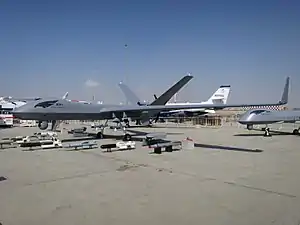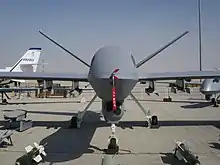CAIG Wing Loong II
The Chengdu Wing Loong II (Chinese: 翼龙 II; pinyin: Yìlóng Èr; lit. 'Pterodactyl II'), military designation GJ-2, is an unmanned aerial vehicle (UAV) capable of remotely controlled or autonomous flight developed by the Chengdu Aircraft Industry Group in the People's Republic of China. Intended for use as a surveillance and aerial reconnaissance and precision strike platform, Chengdu unveiled the concept of Wing Loong II at the Aviation Expo China in Beijing in September 2015. Wing Loong II has long range strike capability with a satellite link.
| Pterodactyl II | |
|---|---|
 | |
| Wing Loong II at Dubai Air Show 2017 | |
| Role | MALE UCAV |
| Manufacturer | Chengdu Aircraft Industry Group |
| Designer | Chengdu Aircraft Design Institute |
| First flight | February 2017[1] |
| Introduction | 2017 |
| Status | In service |
| Primary user | People's Liberation Army Air Force |
| Produced | 2015-present |
| Developed from | CAIG Wing Loong |
Development
The prototype of the Wing Loong II was presented for the first time to the public during the Airshow China exhibition, held in Zhuhai from 1-6 November, 2016.[2]
Design

Wing Loong II UAV MALE is an enlarged version of Wing Loong I with longer body and wider wing span. It has a slender fuselage, V-tail and ventral fin. The aircraft features retractable landing gear, including two main wheels under the fuselage and one single wheel under the nose. Each wing has three Hardpoints under the wings with capability of carrying bombs, rockets or air-to-surface missiles. A satellite communications antenna is situated on top front surface of the fuselage, offering long range data transmission between the UAV and the ground station.[2]
Variants
Operational history
The Wing Loong II is used by UAE to perform airstrike against the Government of National Accord in Libyan civil war. The GNA received 12 Bayraktar TB2s in two batches between May and July, at least half of them have been destroyed during LNA airstrikes using Wing Loong IIs, the second batch delivered in July was to replace the losses of the first.[7] As June 2020, a total of 6 Wing Loong II have been reported shot down or lost in Libya, all operated by the LNA.[8] including one allegedly shot down by a laser, if this was true then it was the first time in history that a laser weapon shot down a combat vehicle.[9]
The investigation led by BBC Africa Eye and BBC Arabic Documentaries revealed that the UAE used Wing Loong II drones to fire Chinese Blue Arrow 7 missile at a military academy in Libya's capital, Tripoli, in January 2020, killing 26 unarmed cadets. The drone was operated from Libya's Al-Khadim air base which has been under the control of the UAE.[10]
Operators
 Bangladesh — Unknown number ordered.[11]
Bangladesh — Unknown number ordered.[11] China — In service with the People's Liberation Army Air Force in 2018, as GJ-2.
China — In service with the People's Liberation Army Air Force in 2018, as GJ-2. Saudi Arabia — In service with Royal Saudi air force. Used during the Yemeni civil war against Houthi militias.
Saudi Arabia — In service with Royal Saudi air force. Used during the Yemeni civil war against Houthi militias. Pakistan — In October 2018, it was announced that Pakistan Aeronautical Complex and Chengdu Aircraft Corporation would jointly produce 48 Wing Loong II UAVs for use in the Pakistan Air Force.[12][13][14]
Pakistan — In October 2018, it was announced that Pakistan Aeronautical Complex and Chengdu Aircraft Corporation would jointly produce 48 Wing Loong II UAVs for use in the Pakistan Air Force.[12][13][14] United Arab Emirates — Launch customer for Wing Loong II in 2017.[15]
United Arab Emirates — Launch customer for Wing Loong II in 2017.[15] Egypt 32 unit have been delivered from 2017 to 2018 according to SIPRI.
Egypt 32 unit have been delivered from 2017 to 2018 according to SIPRI. Nigeria The Nigerian Airforce, NAF has acquired two Wing Loong II Unmanned Combat Aerian Drones to fight Boko Haram terrorism and banditry.
Nigeria The Nigerian Airforce, NAF has acquired two Wing Loong II Unmanned Combat Aerian Drones to fight Boko Haram terrorism and banditry.
Specifications (Wing Loong II)
Data from Army Recognition[2]
General characteristics
- Crew: None
- Length: 11 m (36 ft 1 in)
- Wingspan: 20.5 m (67 ft 3 in)
- Height: 4.1 m (13 ft 5 in)
- Max takeoff weight: 4,200 kg (9,259 lb)
Performance
- Maximum speed: 370 km/h (230 mph, 200 kn)
- Stall speed: 150 km/h (93 mph, 81 kn)
- Endurance: 32 hours
- Service ceiling: 9,900 m (32,500 ft)
Armament
Avionics
- Air to ground radars
- GPS communication system
- Electro-optical pod with day light and infrared cameras and sensors
- Satellite link
See also
Aircraft of comparable role, configuration, and era
Related lists
References
- "China's AVIC Achieves First Flight of Wing-Loong II UAV".
- "WING LOONG II UAV MALE". Army Recognition.
- "组图:翼龙-2无人机挂载能力强悍_新闻_腾讯网". News.qq.com. Retrieved 2020-01-19.
- 2016-10-28 13:57:20 来源:观察者网 (2016-10-28). ""翼龙2"或入列中国空军 "彩虹5"将出口中东-搜狐军事频道". Mil.sohu.com. Retrieved 2020-01-19.
- Wong, Kevin (7 November 2018). "Airshow China 2018: Wing Loong II armed reconnaissance UAV enters PLAAF service". IHS Jane's 360. Zhuhai. Archived from the original on 2018-11-07. Retrieved 7 November 2018.
- "Archived copy". Archived from the original on 2018-11-07. Retrieved 2020-01-09.CS1 maint: archived copy as title (link)
- "Chinese drones hunt Turkish drones in Libya air war". South China Morning Post. 2019-09-29. Retrieved 2019-11-18.
- "CAIG Wing Loong II - All losses by type (modification)". Retrieved 9 June 2020.
- Timokhin, Alexander. "Turkey uses laser weapon technology to shoot down Chinese UAV Wing Loong II in Libya". Army Recognition. Archived from the original on 2020-04-16. Retrieved 2019-08-12.
- "UAE implicated in lethal drone strike in Libya". BBC News. Retrieved 28 August 2020.
- "China to deliver combat drones to Bangladesh Army". DEFSECA. Retrieved 5 January 2020.
- Dominguez, Gabriel (9 October 2018). [Rahul "Bedi"] Check
|url=value (help). China, Pakistan to jointly produce Wing Loong II UAVs, says report. London, New Delhi. Archived from the original on 9 October 2018. Retrieved 13 October 2018. - "Chinese Wing Loong II drones sold to Pakistan". Army Recognition. 11 October 2018. Archived from the original on 2018-10-11. Retrieved 13 October 2018.
- Nene, Vidi (11 October 2018). "China and Pakistan to Jointly Produce 48 Wing Loong II Drones". Drone Below. Archived from the original on 2018-10-11. Retrieved 13 October 2018.
- Biggers, Christopher (26 January 2018). "UAE revealed as Wing Loong II launch customer". IHS Jane's 360. Washington, DC. Archived from the original on 26 January 2018. Retrieved 26 January 2018.
- "Nigeria acquires sophisticated drones capable of fighting Boko Haram, bandits for 26 hours nonstop". Daily Nigerian. 2020-11-10. Retrieved 2020-11-10.